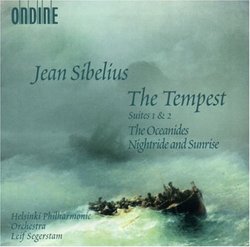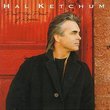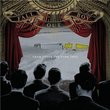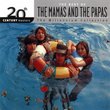| All Artists: Jean Sibelius, Leif Segerstam, Helsinki Philharmonic Orchestra Title: Jean Sibelius: The Tempest, Suites 1 & 2 / The Oceanides / Nightride and Sunrise - Helsinki Philharmonic Orchestra / Leif Segerstam Members Wishing: 0 Total Copies: 0 Label: Ondine Release Date: 11/17/1998 Genre: Classical Styles: Forms & Genres, Theatrical, Incidental & Program Music, Symphonies Number of Discs: 1 SwapaCD Credits: 1 UPC: 761195091425 |
Search - Jean Sibelius, Leif Segerstam, Helsinki Philharmonic Orchestra :: Jean Sibelius: The Tempest, Suites 1 & 2 / The Oceanides / Nightride and Sunrise - Helsinki Philharmonic Orchestra / Leif Segerstam
CD DetailsSimilarly Requested CDs
|
CD ReviewsSibelius, rare and well-done. Bob Zeidler | Charlton, MA United States | 08/13/2001 (5 out of 5 stars) "I had been searching for a modern-day replacement of a venerable recording of Sibelius's "The Oceanides" by Sir Thomas Beecham conducting his Royal Philharmonic Orchestra (now unfortunately "no longer available"). For an even longer time, I had been seeking out a replacement for an even older monophonic London (British Decca) LP performance of his "Nightride and Sunrise" by Sir Anthony Collins. I had not been on the lookout for a new recording of his "Incidental Music for `The Tempest'," but I'm certainly pleased that it is the centerpiece of this new Ondine recording, featuring Leif Segerstam conducing the Helsinki Philharmonic Orchestra. The incidental music to Shakespeare's "The Tempest" may well be the most modernistic (and least "typical") of all of Sibelius's music. (Some might reserve this description for his 4th Symphony, but I think that the Tempest incidental music hits closer to the mark.) The putative location of Shakespeare's play is Bermuda, but this is a Bermuda that few if any of us are ever likely to recognize through Sibelius's music. Only the "Storm" scene in the first of these two suites gives any indication that this mythic place might be a mid-ocean island being battered by a tropical storm. (There is a "Prelude" to the two suites, not included in this performance, which clearly provides a musical/aural equivalent of a hurricane - in fact, the very storm which leaves little doubt as to the cause of a wrecked and sinking ship as the initial curtain rises on the play.) The first suite represents Sibelius at his most adventurous, thematically, harmonically and in terms of scoring. Some of the scenes in this suite are full of dissonance, with episodic, even fragmentary, melodic ideas, identifiably Sibelian but just barely. Matters in the second suite are set on a smaller orchestral scale and palette, and the music is much more identifiably Sibelian. I find Segerstam's performance, and the sound offered up by the Ondine engineers, to be better by more than just a little than a quite recent recording by Neemi Järvi conducting the Gothenberg Symphony Orchestra on the BIS label. (Järvi does have the benefit of including the Prelude to the two scenes, but large portions of the music in this Prelude are later incorporated in "The Storm." So, aside from its role in setting the curtain-lifting stage, the absence of the Prelude is not a major loss in this Ondine recording.) "The Oceanides" and "Nightride and Sunrise" are from earlier periods in Sibelius's composing career (approximately contemporary with the 4th and 2nd symphonies respectively). "The Oceanides," despite its being composed at the time of the 4th Symphony, gives us a preview of "late Sibelius," the Sibelius of the 7th Symphony and "Tapiola." Typically episodic and atypically impressionistic, this tone poem is lean, even stark, in its portrayal of the sea, much as the stark, bleak "Tapiola" depicts the Finnish forests. "Nightride and Sunrise" is almost minimalist in its characteristic repetitive ostinatos heard throughout, ending with a stirring chorale to represent the coming of a new day. All three of these Sibelius works are relative rarities. It is good to see them coupled together in what can be described as authoritative performances by Segerstam and his Helskinki orchestra. The recorded sound is full and resplendent. Certainly a worthwhile addition to the library of any Sibelius completist. Bob Zeidler" A fine example how Sibelius should be played. CAHANA JOEL | Haifa , Israel | 05/10/2000 (5 out of 5 stars) "Sibelius is a real challange for conductors and orchestras .The wide diversity in the works of this composer and the abundance of musical shapes even in a single work make the life of every preformer hard enough . If you got the chance to listen to several performances of the same musical peace you should grasp immmediately the difference. Leif Segerstam has a home advantage upon other conductors because he was born in Finland and has the special attitude which foreign conductors lack so much . Sibelius is played under his button wonderfully and real "Soumi"....I can only try to close my eyes and just be there with the music . Adding to a wonderfull performance is enormous sound quality .What more does a real Sibelius fun need?...." Sibelius as a Painter for the Theater Grady Harp | Los Angeles, CA United States | 02/11/2006 (5 out of 5 stars) "Though Sibelius' symphonies are established in the orchestral repertoire and much loved by concertgoers and record collectors (the number of recordings of these symphonies is staggering), few know that Jean Sibelius wrote a great deal of music for the stage. Perhaps this was in part due to his unfulfilled desire to compose opera, and in part due to his popularity as a national hero.
Among his finest music for theater is the incidental music for a 1926 production of Shakespeare's 'The Tempest' for the Royal Theater in Copenhagen. Though the original work consisted of over an hour of music composed for large orchestra, soloists, and chorus, what has sustained are the two suites Sibelius himself extracted from the original score. These suites contain some of the most beautiful melodies and tone poem paintings Sibelius ever wrote. The scoring is lush, especially for the 'Chorus of Winds', jocular as in the 'Dance of the Nymphs', and deeply romantic when he provides music to recall Miranda and Ferdinand. By definition these 'suites' are episodic which is unlike the long sweeping movements of his symphonies. But in the hands of conductor Leif Segerstam and the Helsinki Philharmonic Orchestra the flow is even and propulsive. For those unfamiliar with this work this recording is as fine as any yet released. Included on the CD are the much more familiar tone poems 'The Oceanides' and 'Nightride and Sunrise', two works that complement 'The Tempest' thematically and sonically. This is one of those finely honed, intelligent programs of fresh works by a well-known composer that deserves attention. Highly Recommended. Grady Harp, February 06 " |


 Track Listings (20) - Disc #1
Track Listings (20) - Disc #1








